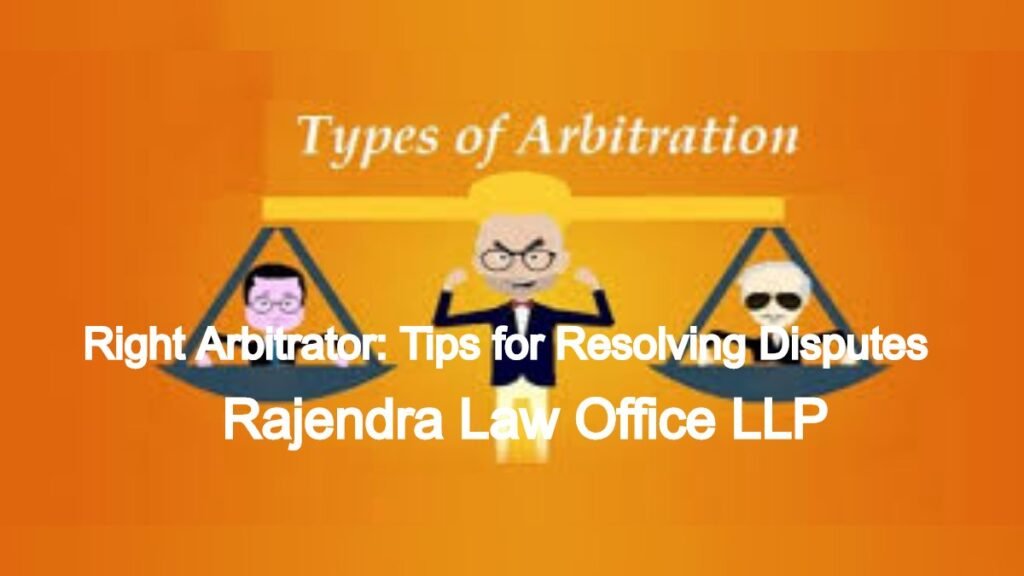Choosing the Right Arbitrator: Disputes are an inevitable part of business. However, navigating the complexities of litigation can be time-consuming, expensive, and damage relationships. Arbitration offers a compelling alternative, providing a private and efficient forum for resolving disagreements. But the success of arbitration hinges on a crucial decision: selecting the right arbitrator.
Choosing the Right Arbitrator: Navigate Disputes with Confidence – Rajendra Law Office LLP
What is Arbitration and Why Choose It?
Arbitration is a dispute resolution process where parties present their arguments to a neutral third party, the arbitrator. Unlike court proceedings, arbitration is typically confidential and allows for greater flexibility in scheduling and procedures. This makes it a popular choice for businesses seeking a faster, more cost-effective way to resolve conflicts while maintaining confidentiality.
The Power of the Right Arbitrator
The arbitrator plays a central role in shaping the outcome of an arbitration. Their expertise, experience, and temperament significantly impact the process and the final award. Therefore, choosing the right arbitrator is a critical step in securing a successful resolution.
Rajendra Law Office LLP: Your Partner in Effective Arbitration
Rajendra Law Office LLP, a leading Chennai-based law firm, possesses extensive experience in arbitration. Our team of skilled lawyers understands the importance of selecting the most suitable arbitrator for your specific case. We will guide you through this crucial selection process, ensuring you choose an arbitrator with the following qualities:
- Subject Matter Expertise: An ideal arbitrator possesses in-depth knowledge of the industry or legal area relevant to your dispute. This ensures they grasp the complexities of the case and make well-informed decisions.
- Neutrality and Impartiality: The arbitrator must be completely unbiased and impartial. They should have no prior connection to either party or any vested interest in the outcome of the case.
- Experience and Proven Track Record: A seasoned arbitrator with a proven track record inspires confidence in the fairness and efficiency of the process. Look for experience in handling similar disputes and a reputation for issuing clear and well-reasoned awards.
- Availability and Efficiency: Time is money, especially in business disputes. Choose an arbitrator who is readily available to conduct hearings and issue a timely award.
- Communication Skills and Procedural Fairness: Arbitration thrives on clear communication. The arbitrator should be a skilled communicator who facilitates the exchange of information effectively. Additionally, they should ensure both parties have the opportunity to be heard and that the proceedings adhere to established principles of fairness.
Beyond the Essentials: Additional Considerations
While the qualities mentioned above are crucial, other factors can influence your decision.
- Geographical Location: Consider the location of the arbitration and the arbitrator’s familiarity with local legal practices.
- Language: If parties involved speak different languages, consider the arbitrator’s fluency in those languages or their willingness to utilize interpreters.
- Cost: Arbitrator fees can vary. Discuss fees upfront and ensure they align with your budget.
Rajendra Law Office LLP: Your Trusted Guide
Choosing the right arbitrator can be an overwhelming task. Rajendra Law Office LLP steps in to simplify this process. Our lawyers will meticulously analyze your case, identify potential arbitrators, and guide you through their qualifications and experience. We will work collaboratively with you to select the arbitrator who best aligns with your specific needs and provides the best chance for a successful outcome.
FAQs: Frequently Asked Questions about Choosing an Arbitrator
Several resources can help you find qualified arbitrators. Legal professional associations, arbitration institutions, and online directories like the American Arbitration Association (AAA) offer arbitrator search functionalities.
Absolutely. In some cases, parties might mutually agree on a preferred arbitrator. However, if an agreement can’t be reached, specific arbitration rules or procedures will outline a method for selecting one.
There can be situations where an arbitrator withdraws due to scheduling conflicts or a potential conflict of interest. In such scenarios, the selection process will restart, following the established procedures for choosing a replacement.
While arbitration awards are generally final and binding, there are limited grounds for challenging them. This could occur if the arbitrator exhibits bias or misconduct during the process, or if the award itself is deemed in violation of public policy.
Our team of legal professionals possesses deep knowledge of arbitration practices and access to a vast network of qualified arbitrators. We will leverage our expertise to identify potential arbitrators, evaluate their qualifications, and guide you through the selection process, ensuring you choose the best fit for your case.
Read More
- Choosing a Law Firm for Civil Cases: Key Factors to Consider
- Accelerate Success: India Entry Services for Entrepreneurs
- Turn Vision into Reality: Expert SME IPO Services for Lasting Impact
- Crafting Your Income Tax Notice Response: Expert Legal Services
- Navigating Mortgage and Financing Agreements: Legal Assistance
- Department of Legal Affairs:

